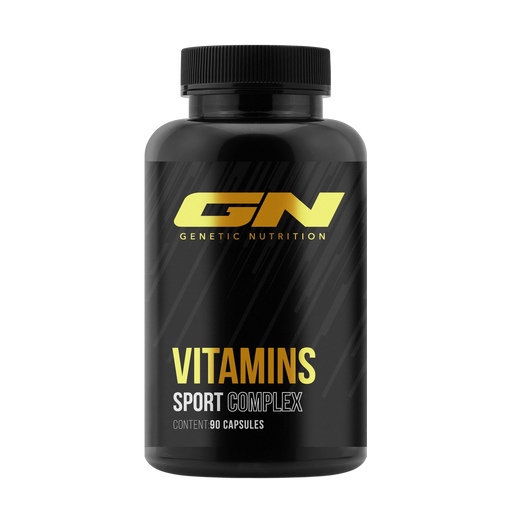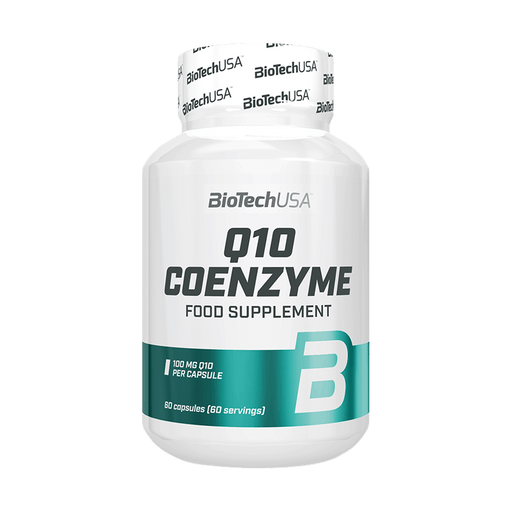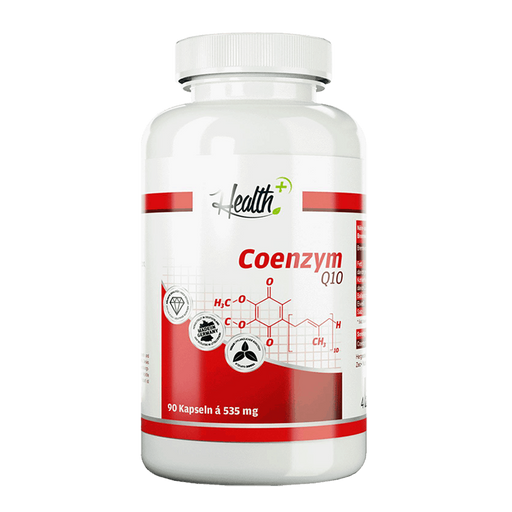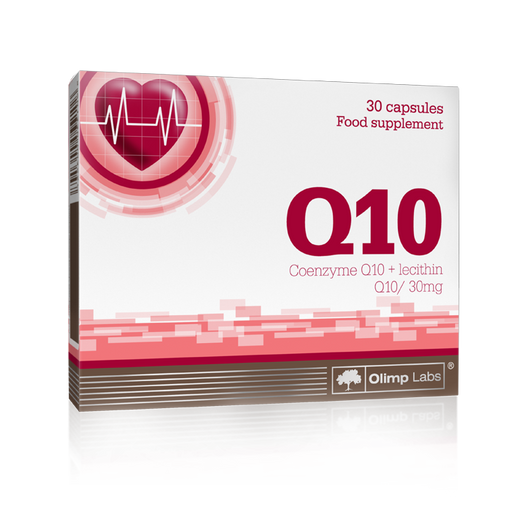Coenzyme Q10
-
 Save 0%
Save %
Original price €34,90 - Original price €34,90Original price €34,90€34,90€34,90 - €34,90Current price €34,90| /
Save 0%
Save %
Original price €34,90 - Original price €34,90Original price €34,90€34,90€34,90 - €34,90Current price €34,90| /Vitamins Sport Complex · 90 capsules
GN Laboratories117 reviewsThe "insurance policy" for every athlete and non-athlete, ensuring that no deficiency of any essential vitamin or mineral can affect your maximum p...
View full detailsOriginal price €34,90 - Original price €34,90Original price €34,90€34,90€34,90 - €34,90Current price €34,90| /Save 0% Save % -
 Save 0%
Save %
Original price €22,90 - Original price €22,90Original price €22,90€22,90€22,90 - €22,90Current price €22,90| /
Save 0%
Save %
Original price €22,90 - Original price €22,90Original price €22,90€22,90€22,90 - €22,90Current price €22,90| /Q10 · 60 capsules
GN Laboratories10 reviewsQ10 is a coenzyme that has numerous health benefits. These can range from promoting fat loss (1) to improving athletic performance (2). As always, ...
View full detailsOriginal price €22,90 - Original price €22,90Original price €22,90€22,90€22,90 - €22,90Current price €22,90| /Save 0% Save % -
 Save 0%
Save %
Original price €18,90 - Original price €18,90Original price €18,90€18,90€18,90 - €18,90Current price €18,90| /
Save 0%
Save %
Original price €18,90 - Original price €18,90Original price €18,90€18,90€18,90 - €18,90Current price €18,90| /Q10 Coenzyme · 60 capsules
Biotech USANo reviewsHigh-quality supplement with 100 mg Q10 per serving. Q10 plays an important role in energy metabolism. Natural sources and no inferior ingredients...
View full detailsOriginal price €18,90 - Original price €18,90Original price €18,90€18,90€18,90 - €18,90Current price €18,90| /Save 0% Save % -
 Save 0%
Save %
Original price €20,90 - Original price €20,90Original price €20,90€20,90€20,90 - €20,90Current price €20,90| /
Save 0%
Save %
Original price €20,90 - Original price €20,90Original price €20,90€20,90€20,90 - €20,90Current price €20,90| /Coenzyme Q10 Health+ · 90 capsules
Zec+1 reviewVielseitiges Coenzym Q10: Bekannt für die Förderung von Energiegewinnung, Unterstützung des Immunsystems und Anti-Aging-Eigenschaften. Ähnlichke...
View full detailsOriginal price €20,90 - Original price €20,90Original price €20,90€20,90€20,90 - €20,90Current price €20,90| /Save 0% Save % -
 Save 0%
Save %
Original price €12,90 - Original price €12,90Original price €12,90€12,90€12,90 - €12,90Current price €12,90| /
Save 0%
Save %
Original price €12,90 - Original price €12,90Original price €12,90€12,90€12,90 - €12,90Current price €12,90| /Q10 · 30 capsules
Olimp Sport NutritionNo reviewsOLIMP Q10 is a dietary supplement with co-enzyme Q10 and lecithin. Co-enzyme Q10 increases efficiency, strengthens the heart and improves immune f...
View full detailsOriginal price €12,90 - Original price €12,90Original price €12,90€12,90€12,90 - €12,90Current price €12,90| /Save 0% Save %
The coenzyme was discovered back in 1957 at the University of Wisconsin, USA. Under the direction of Prof. Frederick Crane, the aim was to investigate the mode of action of mitochondria in living cells using ordinary bovine hearts. The researchers succeeded in isolating a yellowish substance from the heart muscle cells, the significance of which was quickly recognized. The research group led by Prof. Karl Folkers at the Institute for Biomedical Research at the University of Texas deciphered the chemical formula of the yellow crystals and named them coenzyme Q10. Prof. Folkers was one of the first to prove the existence of Q10 in human cells and to recognize the enormous importance of coenzyme Q10 for humans.
Q10 production - Japan as a pioneer
For a long time, bovine heart remained the only reliable source of Q10 and the extraction of the coenzyme was very difficult and cost-intensive. The cost of one gram of Q10 from bovine hearts at the time was around 1000 US dollars. In the early 1970s, a technology was developed in Japan that made it possible to produce large quantities of Q10 from the tobacco plant at low cost. Industrial production of Q10 from tobacco residues began in 1974. However, Q10 supplies remained limited until another technological advance was made in Japan in 1977: Q10 production through fermentation. This laid the foundation for intensive research into Q10. Since then, the vital substance has been available in sufficient quantities and the price of the raw material has fallen rapidly - from 1000 US dollars to less than 10 US dollars per gram. The world's largest production sites for Q10 are in Asia; the vital substance has been recognized and used there as a vital substance for many years.
Q10 research
Since the early 1980s, numerous clinical studies have been carried out in which the therapeutic and preventive effect of the coenzyme Q10 has been demonstrated in a wide range of diseases. These include heart disease and arteriosclerosis.
American scientists as pioneers of Q10 research
Prof. Frederick L. Crane and Prof. Karl A. Folkers from the USA are regarded as pioneers of coenzyme Q10 research. Prof. Crane discovered the substance in the mitochondria of the bovine heart in 1957 and isolated it as a separate substance. A year later, Prof. Folkers decoded the chemical formula of the yellow crystals and named them coenzyme Q10. Prof. Folkers is considered the "father" of coenzyme Q10 research. Due to his persistent efforts and consistent references to the performance of this endogenous substance, other scientists also became aware of Q10 and so research was driven forward. For his work on coenzyme Q10 and vitamins B6 and B12, Prof. Folkers received the Priestley Medal in 1986, one of the highest awards of the American Chemical Society for outstanding achievements in chemistry and medicine. In 1990, Karl Folkers was honored by US President George Bush with the President's National Medal of Science for his achievements.
Coenzyme Q10 is a compound that is produced by the body and stored in the mitochondria of cells (2). The mitochondria are responsible for energy production and also protect cells from oxidative damage and disease-causing bacteria or viruses (3). Coenzyme Q10 production decreases with age, which means that older people tend to have a coenzyme Q10 deficiency. Some other potential causes of coenzyme Q10 deficiency include the following (2, 4):
- Nutritional deficiencies such as a vitamin B6 deficiency
- Genetic defects in the area of coenzyme Q10 synthesis or utilization
- An increased requirement as a result of a disease
- Mitochondrial diseases
- Oxidative stress due to ageing
- Side effects of treatment with statins
Scientific research has found that coenzyme Q10 plays several key roles in the body. One of the primary functions of coenzyme Q10 is to support energy production in the cells. It is involved in the production of adenosine triphosphate (ATP), which is required for energy transfer within cells (2). Its other important role is as an antioxidant, protecting cells from oxidative damage (2, 5). Excessive amounts of free radicals lead to oxidative damage, which can impair regular cell function. This damage is known to cause many health problems and diseases (6). Considering that ATP is required for all bodily functions and oxidative damage can destroy the body's cells, it is not surprising that some chronic diseases are associated with low coenzyme Q10 levels (5). Coenzyme Q10 is found in every cell of the body, with the highest concentrations in organs with the highest energy requirements such as the heart, kidneys, lungs and liver (7). The following is a list of the most important benefits of coenzyme Q10. In addition to activating body energy and protecting the cell from free radicals, coenzyme Q10 stabilizes the cell walls and ensures their permeability for vital substances. In order to fulfill these functions, the coenzyme is stored directly in the cell membranes.
1. coenzyme Q10 could help in the treatment of heart failure
Heart failure is often a consequence of other heart diseases such as coronary artery disease or high blood pressure (8). These diseases can lead to increased oxidative damage and inflammation of veins and arteries (8, 9). Heart failure occurs when these problems strain the heart to the point where it is no longer able to contract, relax or pump blood around the body normally (8). To make matters worse, some treatments for heart failure have unwanted side effects such as low blood pressure, while others can further lower coenzyme Q10 levels (10). In a study of 420 people suffering from heart failure, treatment with coenzyme Q10 over a two-year period reduced the symptoms of the disease and the risk of dying from heart problems (11).
In another study, 641 people were treated with coenzyme Q10 or a placebo for one year. At the end of the study, it was found that the subjects who were treated with coenzyme Q10 were less likely to be hospitalized for worsening heart failure during the study period and also experienced fewer serious complications (12). It appears that treatment with coenzyme Q10 may promote restoration of optimal energy production, reduction of oxidative damage and improved cardiac function, all of which may aid in the treatment of heart failure (8).
Summary: Coenzyme Q10 appears to assist in the treatment of heart failure by improving cardiac function, increasing ATP production and limiting oxidative damage.
2. coenzyme Q10 could support fertility
Female fertility declines with age due to the number and quality of eggs available. Coenzyme Q10 is directly involved in this process. During aging, the body's own coenzyme Q10 production decreases, making the body less effective at protecting the oocytes from oxidative damage (13). Supplementation with coenzyme Q10 appears to help and may even reverse this age-related decline in egg quality and quantity. Male sperm are also sensitive to oxidative damage, which can result in reduced sperm count, poor sperm quality and infertility (15). Several studies have concluded that supplementation with coenzyme Q10 can improve sperm quality, activity and concentration by increasing antioxidant protection (15, 16). Summary: The antioxidant properties of coenzyme Q10 may help to improve sperm quality and reduce a decrease in the number and quality of oocytes in women.
3. coenzyme Q10 could help keep the skin young
The skin is the largest organ of the human body and is exposed to a large amount of damaging agents that contribute to skin ageing. These agents can be internal and external in nature. Some internal damaging factors include cellular damage and hormonal imbalances. External factors include environmental factors such as UV rays (17). Harmful elements can lead to reduced skin hydration and reduced protection against aggressive environmental factors, as well as thinning of the layers of the skin (17, 18). Applying coenzyme Q10 directly to the skin can reduce damage caused by internal and external factors by increasing energy production in skin cells and promoting antioxidant protection (19). It has also been shown that applying coenzyme Q10 directly to the skin can reduce oxidative damage caused by UV rays and even reduce the depth of wrinkles in the skin (20). In addition, people with low coenzyme Q10 levels appear to be more susceptible to developing skin cancer (21) Summary: Applied directly to the skin, coenzyme Q10 can reduce damage from sun exposure and increase antioxidant protection. Supplementation with coenzyme Q10 may also help reduce the risk of skin cancer.
4 Coenzyme Q10 could reduce headaches
Abnormal mitochondrial function can lead to increased calcium uptake by cells, excessive free radical production and reduced antioxidant protection. This can result in reduced energy levels in brain cells and migraines (22). As coenzyme Q10 is mainly found in the mitochondria of cells, it has been shown to improve mitochondrial function and help reduce inflammation that can occur during migraine attacks (23). One study showed that supplementation with coenzyme Q10 was three times more likely than a placebo to reduce the number of migraine attacks in 42 migraine sufferers (24). In addition, coenzyme Q10 deficiency has been observed in people suffering from migraines. A larger study showed that 1,550 people with low coenzyme Q10 levels experienced less frequent and less severe headaches after treatment with coenzyme Q10 (25). In addition to this, coenzyme Q10 appears to not only help treat migraines, but may also help prevent migraines (26). Summary: Coenzyme Q10 supplementation appears to help prevent and treat migraines by improving mitochondrial function and reducing inflammation.
5 Coenzyme Q10 could boost exercise performance
Oxidative stress can impair muscle function and therefore exercise performance (27) and abnormal mitochondrial function can reduce muscle energy, making it difficult for muscles to contract and perform efficiently (28, 29). Coenzyme Q10 can promote exercise performance by reducing oxidative stress in cells and improving mitochondrial function (30). In a study investigating the effects of coenzyme Q10 on physical activity, it was observed that subjects who supplemented with 1,200 mg of coenzyme Q10 per day for 60 days showed reduced oxidative stress (31). In addition, supplementation with coenzyme Q10 can help to increase strength during exercise and reduce fatigue, both of which can improve exercise performance (32, 33, 34). Summary: Exercise performance can be impaired by oxidative stress and mitochondrial dysfunction. Coenzyme Q10 may help to reduce oxidative damage, increase exercise capacity and reduce fatigue.
6. coenzyme Q10 could help with diabetes
Oxidative stress can cause cell damage that can result in metabolic diseases such as diabetes (35). In addition, abnormal mitochondrial function has been linked to insulin resistance (35). Coenzyme Q10 has been shown to improve insulin sensitivity and the regulation of blood glucose levels (36). Supplementation with coenzyme Q10 could also help to triple the coenzyme Q10 concentration in the blood of diabetics, who typically have low coenzyme Q10 levels (37, 38). In one study, people with type 2 diabetes supplemented with coenzyme Q10 over a period of 12 weeks. This significantly reduced fasting blood glucose levels and hemoglobin A1C levels, which are an indicator of average blood glucose levels over the previous two to three months (39). Finally, coenzyme Q10 may help prevent diabetes by stimulating the breakdown of fats and reducing the accumulation of fat cells that can lead to obesity or type 2 diabetes (40). Summary: Supplementation with coenzyme Q10 may help to increase insulin sensitivity and improve blood glucose levels.
7 Coenzyme Q10 may play a role in cancer prevention
Oxidative stress is known to cause cell damage and impair cell function (41). If your body is unable to fight oxidative damage, the structure of its cells may be damaged, potentially increasing the risk of cancer (41, 42). Coenzyme Q10 can protect cells from oxidative stress and promote cellular energy production, thereby promoting cell health and survival (42, 43). Interestingly, it has been shown that cancer patients have lower coenzyme Q10 levels. Low coenzyme Q10 levels have also been associated with a 53.3% higher risk of cancer and indicate a poor prognosis for different types of cancer (43, 44, 45). In addition, one study suggests that supplementation with coenzyme Q10 may reduce the risk of cancer recurrence (46). Summary: Coenzyme Q10 plays a crucial role in DNA protection and cell survival, both of which are closely linked to the prevention of cancer and cancer recurrence.
8 Coenzyme Q10 is good for the brain
The mitochondria are the primary energy producers for the brain. Mitochondrial function tends to decline with age and mitochondrial dysfunction can lead to brain cell death and brain diseases such as Alzheimer's and Parkinson's (47). Unfortunately, the brain is highly susceptible to oxidative damage due to its high fatty acid content and high oxygen demand. This oxidative damage increases the production of harmful compounds that can impair memory, cognitive and physical function (48, 49). Coenzyme Q10 may reduce the production of these harmful compounds and potentially slow the progression of Alzheimer's and Parkinson's disease (50, 51). Summary: Coenzyme Q10 has been shown to protect brain cells from oxidative damage and reduce the actions of harmful compounds that can lead to brain disease.
9. coenzyme Q10 could protect the lungs
Of all organs, the lungs have the most contact with oxygen, making them highly susceptible to oxidative damage. Increased oxidative damage in the lungs and poor antioxidant protection, which includes low coenzyme Q10 levels, can result in lung diseases including asthma and chronic obstructive pulmonary disease (COPD) (52). In addition, it has been shown that people suffering from these diseases have lower coenzyme Q10 levels (53, 54). One study showed that supplementation with coenzyme Q10 can reduce inflammation in asthma patients and the need for asthma medication (55). Another study showed improvements in exercise performance in COPD patients who supplemented with coenzyme Q10. This was observed by a better oxygen supply to the tissue and a better heart rate after coenzyme Q10 supplementation (56). Summary: Coenzyme Q10 can reduce oxidative damage and inflammation that can result in lung disease.
Dosages and side effects of coenzyme Q10
There are two different forms of coenzyme Q10: ubiquinol and ubiquinone. Ubiquinol is responsible for 90% of coenzyme Q10 in the blood and is the most absorbable form of coenzyme Q10 (57, 58). The standard dosage of coenzyme Q10 ranges from 90 to 200 mg per day. Doses of up to 500 mg appear to be well tolerated and several scientific studies have used even higher doses without serious side effects (59, 60, 61). As coenzyme Q10 is a fat-soluble compound, it is absorbed slowly and only in limited quantities. Taking it with food can help the body absorb coenzyme Q10 up to three times faster than without food (2, 62). Some products also contain a more soluble form of coenzyme Q10 or a combination of coenzyme Q10 and oil to improve absorption (63, 64, 65). The human body cannot store coenzyme Q10, so daily supplementation is recommended to maximize the benefits of coenzyme Q10 (58, 66). Supplementation with coenzyme Q10 appears to be well tolerated and has low toxicity (58). In fact, participants in some studies using daily doses of 1,200 mg coenzyme Q10 for up to 16 months showed no major side effects (51). If side effects do occur, it is recommended to divide the daily dose into two or three smaller single doses spread throughout the day. Summary: As coenzyme Q10 is a fat-soluble compound, it is recommended to take it with food or to use a product that combines coenzyme Q10 with oil. Coenzyme Q10 supplementation appears to be well tolerated with low toxicity.
Food sources for coenzyme Q10
Coenzyme Q10 can not only be taken in the form of supplements, but can also be found in some foods. The absorption of coenzyme Q10 in capsule form or in the form of food appears to be similarly good (67).
The following foods contain coenzyme Q10
- Offal: Heart, liver and kidneys
- Some meats: pork, beef and poultry
- Fatty fish: trout, herring, mackerel and sardines
- Vegetables: spinach, cauliflower and broccoli
- Fruit: oranges and strawberries
- Legumes: soybeans, lentils and peanuts
- Nuts and seeds: Sesame seeds and pistachios
- Oils: soybean oil and rapeseed oil
Summary: Coenzyme Q10 is found in some foods - especially offal. It appears to be similarly well absorbed in the form of supplements and in the form of food.
Conclusion
Coenzyme Q10 is a water-soluble, vitamin-like compound that appears to have many health benefits. It is involved in cellular energy production and serves as an antioxidant. These properties make coenzyme Q10 a helpful compound when it comes to maintaining cellular health and protecting against or treating some chronic diseases. Coenzyme Q10 has been shown to help improve heart health and regulate blood sugar levels, as well as aid in the prevention and treatment of cancer and reduce the incidence of migraines. It may also reduce oxidative damage that can lead to muscle fatigue, skin damage and diseases of the brain and lungs. Coenzyme Q10 can be found in supplements that appear to be well tolerated. It is also found in some foods such as offal, vegetables and pulses. As coenzyme Q10 production decreases with age, adults of all ages can benefit from more coenzyme Q10. Whether you consume more foods high in coenzyme Q10 or use coenzyme Q10 supplements, coenzyme Q10 could benefit your health.
References
- https://www.ncbi.nlm.nih.gov/pubmed/24389208
- https://www.ncbi.nlm.nih.gov/pubmed/25126052
- https://www.ncbi.nlm.nih.gov/pubmed/23065343
- https://www.ncbi.nlm.nih.gov/pubmed/25126048
- https://www.ncbi.nlm.nih.gov/pubmed/8241707
- https://www.ncbi.nlm.nih.gov/pubmed/24483238
- https://www.ncbi.nlm.nih.gov/pubmed/21966175/
- https://www.ncbi.nlm.nih.gov/pubmed/26512330
- https://www.ncbi.nlm.nih.gov/pubmed/27012265
- https://www.ncbi.nlm.nih.gov/pubmed/26199309
- https://www.ncbi.nlm.nih.gov/pubmed/25282031
- https://www.ncbi.nlm.nih.gov/pubmed/8241697
- https://www.ncbi.nlm.nih.gov/pubmed/26111777
- https://www.ncbi.nlm.nih.gov/pubmed/24578993
- https://www.ncbi.nlm.nih.gov/pubmed/23912751
- https://www.ncbi.nlm.nih.gov/pubmed/28066832
- https://www.ncbi.nlm.nih.gov/pubmed/24527317/
- https://www.ncbi.nlm.nih.gov/pubmed/25906193
- https://www.ncbi.nlm.nih.gov/pubmed/26648450
- https://www.ncbi.nlm.nih.gov/pubmed/1041605
- https://www.ncbi.nlm.nih.gov/pubmed/16443053
- https://www.ncbi.nlm.nih.gov/pubmed/24331360
- https://www.ncbi.nlm.nih.gov/pubmed/21586650
- https://www.ncbi.nlm.nih.gov/pubmed/15728298
- https://www.ncbi.nlm.nih.gov/pubmed/17355497
- https://www.ncbi.nlm.nih.gov/pubmed/27670440
- https://www.ncbi.nlm.nih.gov/pubmed/11375753
- https://www.ncbi.nlm.nih.gov/pubmed/23182644
- https://www.ncbi.nlm.nih.gov/pubmed/17492503
- https://www.ncbi.nlm.nih.gov/pubmed/21681167/
- https://www.ncbi.nlm.nih.gov/pubmed/20886510/
- https://www.ncbi.nlm.nih.gov/pubmed/19644406/
- https://www.ncbi.nlm.nih.gov/pubmed/18272335/
- https://www.ncbi.nlm.nih.gov/pubmed/18318910/
- https://www.ncbi.nlm.nih.gov/pubmed/28811612
- https://www.ncbi.nlm.nih.gov/pubmed/24586567
- https://www.ncbi.nlm.nih.gov/pubmed/19530339
- https://www.ncbi.nlm.nih.gov/pubmed/10416046
- https://www.ncbi.nlm.nih.gov/pubmed/26413493
- https://www.ncbi.nlm.nih.gov/pubmed/25791371
- https://www.ncbi.nlm.nih.gov/pubmed/24969860
- https://www.ncbi.nlm.nih.gov/pubmed/22126471
- https://www.ncbi.nlm.nih.gov/pubmed/21467235/
- https://www.ncbi.nlm.nih.gov/pubmed/9177262/
- https://www.ncbi.nlm.nih.gov/pubmed/21297042
- https://www.ncbi.nlm.nih.gov/pubmed/17505263
- https://www.ncbi.nlm.nih.gov/pubmed/9974149
- https://www.ncbi.nlm.nih.gov/pubmed/20673763
- https://www.ncbi.nlm.nih.gov/pubmed/20702843
- https://www.ncbi.nlm.nih.gov/pubmed/18560133
- https://www.ncbi.nlm.nih.gov/pubmed/12374491
- https://www.ncbi.nlm.nih.gov/pubmed/16289557
- https://www.ncbi.nlm.nih.gov/pubmed/21080098
- https://www.ncbi.nlm.nih.gov/pubmed/12169177
- https://www.ncbi.nlm.nih.gov/pubmed/16873952
- https://www.ncbi.nlm.nih.gov/pubmed/8241703
- https://www.ncbi.nlm.nih.gov/pubmed/27064932
- https://www.ncbi.nlm.nih.gov/pubmed/27128225
- https://www.ncbi.nlm.nih.gov/pubmed/19096117
- https://www.ncbi.nlm.nih.gov/pubmed/16431002
- https://www.ncbi.nlm.nih.gov/pubmed/17287847
- https://www.ncbi.nlm.nih.gov/pubmed/16551570
- https://www.ncbi.nlm.nih.gov/pubmed/17482886
- https://link.springer.com/article/10.1007/s40005-013-0101-4
- https://www.ncbi.nlm.nih.gov/pubmed/19446761
- https://www.ncbi.nlm.nih.gov/pubmed/19096118





